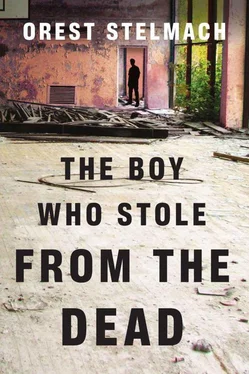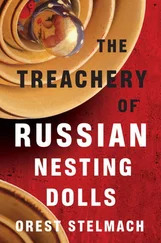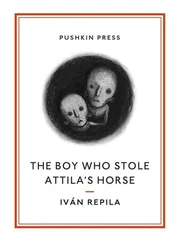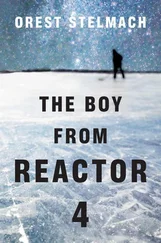The limo was so long the woman saw Nadia’s kick. “No, Ms. Tesla,” she said in Ukrainian. “It’s a good question.” Nadia had to give her credit. Russian was the woman’s primary language but she was speaking the language common to everyone in the car. “It’s a matter of history.”
“History didn’t make you speak Russian instead of Uke when you met us at the airport,” Marko said. “What are you talking about?”
Nadia kicked him again.
“In the 1970s, the leaders of the Soviet Union implemented a program called ‘Russification’,” the woman said.
“By ‘leaders of the Soviet Union’ you mean the Russians,” Marko said. “You mean that bastard Brezhnev.”
“Marko,” Nadia said.
“Yes,” the woman said. “The Politburo and Leonid Brezhnev. The Ukrainian language was forbidden in universities. Pro-Ukrainians were called nationalists. They were persecuted, arrested, put in jail. It got to the point where Kyivans had two choices: send their kids to Russian-speaking schools and tow the line, or move out.”
“Move where?” Marko said.
“Moscow.”
“No way.”
“There was more opportunity in Moscow for Ukrainians to speak Ukrainian than in Kyiv. By 1980, Russian was the only language spoken in Kyiv. Only since independence in 1991 has the Ukrainian language started making a comeback here.”
“Thank God I waited until now to come here,” Marko said.
“Yes,” the woman said. “For your sake, I am also glad you waited.” She turned forward, grabbed a clipboard, and started confirming tomorrow’s itinerary with the driver.
Nadia glared at Marko. “You cannot be this way.”
Marko appeared confused. “What way?”
“Sarcastic, argumentative, confrontational. In short, an asshole. You cannot be an asshole when you’re a guest in someone else’s country.”
“Oh, come on. You know me.”
“I’m here on business, Marko. I’m getting paid.”
He sealed his lips and looked out the window.
The driver turned on the radio. Modern interpretations of traditional Ukrainian folk music started up. A crescent moon hung in the sky. The limousine glided along the tarmac. Green pastures and clusters of forest rolled by.
Memories from last year’s trip flitted in and out of Nadia’s mind. The search for Clementine Seelick, Bobby’s aunt. Nadia’s escape from her pursuers in the tunnels of the Caves Monastery on her hands and knees. And then, Chornobyl, the locket, and the escape with Bobby back to New York.
They crossed the bridge over the river Dnipro. Lights from Kyiv’s skyscrapers illuminated the golden domes of its eleventh century churches and cathedrals.
When they got to the hotel, Nadia and Marko stepped out of the limo. The driver removed their luggage from the trunk. Two well-dressed young men were arguing about something.
“Evgeny will pick you up at nine a.m. to bring you to Orel Group offices,” the woman said. “If that is convenient.”
“Thank you,” Nadia said, “but I need to get started earlier. I need to be there by seven a.m.”
“Then he will pick you up at six forty-five a.m.” She glanced at the driver to make sure he understood. He nodded politely.
One of the young men struck the other in the face. The injured one screamed. Brought his hands to his nose.
A bell captain and two hotel doormen came running.
“What happened here?” one of the doormen said.
The injured man removed his hands from his nose. They were covered with blood. It streamed down his face from his nose.
“This man punched me for no reason,” the injured man said.
He pointed at Marko.
“What are you talking about?” Marko said.
“That’s a lie,” Nadia said.
She remembered her experience last year in Kyiv. Thugs pretended to be cops, planted dope on her, and tried to extort a bribe. This was a scam, too, she realized, but what was the angle?
Marko was going toe-to-toe with the assailant, threatening to stick his head in a blender for being a lying bitch. The driver and the woman were trying to back him up but there was too much screaming. It was chaos.
It was a diversion.
Nadia turned. Their luggage was gone.
“Our luggage,” she said. “Our luggage is gone. It’s a scam to get our luggage.”
She looked left. Nothing. Glanced to the right. Nothing. She swore. Looked around again. Further out this time. She was vaguely aware the two miscreants were running away. Who cared. She needed her luggage.
There. Across the street. A third young man wheeled their luggage toward a taxi. One bag in each hand.
“Thief,” Nadia said. “Stop him.”
She sprinted toward him.
A rawboned man in a tan suit appeared from nowhere and blocked the thief’s path. He didn’t touch the kid. He simply spoke to him. Three sentences. Maybe four. Nadia couldn’t hear what he said but the younger guy dropped the bags and ran away.
The rawboned man helped her retrieve their bags. Up close he appeared to be in his early fifties, with a military crew cut.
“Thank you,” Nadia said in Ukrainian. When he frowned she repeated herself in Russian.
His peppercorn eyes twinkled. “You’re welcome. I was in my car waiting for my wife.” He pointed to a white BMW with black rims. “I saw the whole thing happen.” He sounded quite pleased with himself. “You are a tourist?”
“Yes.”
“Where are you from?”
“America.”
“I love America.” He turned serious and wagged his finger. “Just remember when you go back to America to spread the word. Not everyone in Ukraine is corrupt and criminal.”
He returned to his car as Marko arrived, out of breath.
“He speak Russian or Uke?” Marko said. He waved to the good Samaritan, who smiled and waved back.
“Guess,” Nadia said.
“Damn. I wanted to like him so bad.”
CHAPTER 27

THE GENERAL WOKE up excited and enthused. He was expecting news about the Tesla woman this morning. What started out as a matter of honor was becoming an even more intriguing proposition.
After washing and dressing he took his breakfast in the study. He never ate breakfast with his wife. He had his butler deliver it to his study instead. If he were to eat breakfast with Asya, the layers of fat in her chin might hypnotize him. He might start counting them. By the time he was done it would be time for lunch. That was unacceptable, eating two meals back-to-back with no productive activity in between, even for a retired military hero.
What a cow she’d become, he thought. Once she turned fifty, her metabolism slowed and she shed all inhibitions about portion control. Divorce was allowed in the Orthodox Church and he owned a few judges. He could have dumped her for a nominal settlement years ago and married the ballet instructor. She was always making eyes at him and his Mercedes AMG, the one with the hand-built engine. But if he divorced, the other four remaining members of his hunting club, the Zaroff Seven, would have never looked at him the same. They were old-school Soviet boys. Appearances mattered. Screw the farmer’s daughter—or son—if you had to, but for God’s sake do it in private, and don’t dissolve the marriage.
The General was realizing the truth more and more each day. He had no choice. There was only one way out, one course of action that would allow him to save face. He was going to have to kill her. But this would cause his grandchildren to cry at her funeral. He couldn’t stomach the thought of seeing his grandchildren cry for any reason. And so he went on with the status quo, eating his buckwheat cereal with blueberries in his study every morning, surrounded by the trophies that hung on his wall. Bear, wolf, lynx, argali sheep, red stag, Caucasian tur, snow sheep, wild boar, Siberian tiger. The heads of every animal worth hunting within the boundaries of the former Soviet Union.
Читать дальше













